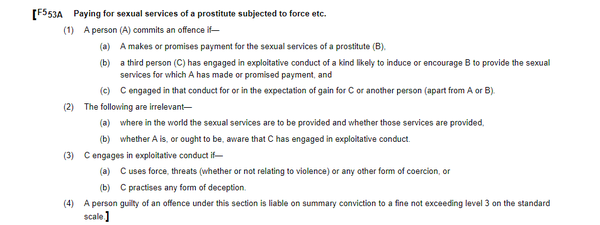The lobby group Christian Action Research and Education (CARE) say the law should change to criminalise the buyer, not the seller, of sex.
Currently, it is only possible for a purchaser of sex to be committing a crime if the 'seller' is subjected to force, either by them, the owner of a brothel or someone who trafficked them into it. The buyer can be prosecuted regardless of whether they knew of the exploitation or not.
It is also illegal to sell someone else's body for sexual services, to use exploitation or to gain from someone else's sexual services.
In Northern Ireland though, buying sex, whether the seller is willing or not, became illegal in June 2015.
CARE argue that whether a prostitute has been 'subjected to force' is not always obvious and want to see similar laws to those in Northern Ireland in the rest of the UK.
They say many women (and some men) have fallen into prostitution after being abused as children, difficult or traumatic childhoods or after suffering from other vulnerabilities such as substance abuse, debt or homelessness.
This is something the Crown Prosecution Service highlight in their approach to prostitution, saying: "The CPS focuses on the prosecution of those who force others into prostitution, exploit, abuse and harm them. Our joint approach with the police, with the support of other agencies, is to help those involved in prostitution to develop routes out".
Criminalising the buyer is thought to decrease demand for prostitution across the board and therefore limit the number of people who are potentially being trafficked.
This change came into affect in Northern Ireland through the Human Trafficking and Exploitation (Criminal Justice and Support for Victims) Act.
Since the Act became law in January 2015, there have been several prosecutions.
Globally, other countries have also adopted this progressive approach with buying sex now illegal in: Sweden, Norway, Iceland, Canada, France, the Republic of Ireland and Israel.
Evidence from Sweden shows that the law has been effective at reducing the demand for paid sex.
CARE's Rachael Adams, who will be running the marathon for this cause, told Premier: "People were created for purpose, not purchase. But our current laws on prostitution do not provide adequate safety or protection for women across Great Britain.
"In Northern Ireland, we've seen successful convictions under the new offence and the law also sends a very powerful signal to wider society about the dignity and value of those in prostitution.
"It's now time for the rest of GB to follow the progressive example set by Northern Ireland.
Current law in the UK.
Stay up to date with the latest news stories from a Christian perspective. Sign up to our daily newsletter and receive more stories like this straight to your inbox every morning.
Tell us what you think about our news service, what you want and how Premier fits into your news landscape. Take our quick survey!






